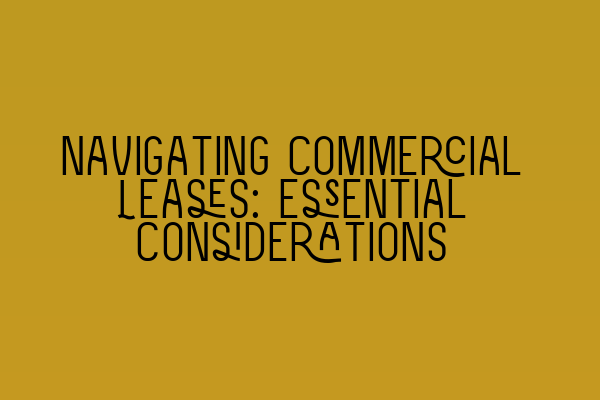Navigating Commercial Leases: Essential Considerations
Commercial leases can be complex legal documents that require careful consideration and attention to detail. As a solicitor specializing in property law, it is crucial to understand the essential considerations when navigating through commercial leases on behalf of clients. In this blog post, we will explore the key aspects that must be taken into account to protect the interests of both landlords and tenants.
1. Lease Structure and Duration:
The structure and duration of a commercial lease play a significant role in the rights and obligations of both parties. It is essential to clearly define the lease term, including any renewal options or break clauses. This will ensure that both the landlord and tenant are aware of their responsibilities for the agreed duration of the lease.
2. Rent and Service Charges:
The financial aspects of a commercial lease are of utmost importance. The rent and service charges must be clearly outlined in the lease agreement, detailing the frequency of payments, any rent reviews, and the calculation of service charges. It is crucial to ensure that the financial obligations are fair and reasonable for both parties.
3. Repair and Maintenance:
A well-drafted commercial lease should address the repair and maintenance responsibilities of both the landlord and the tenant. The lease should clearly outline who is responsible for the upkeep of the premises, including structural repairs, internal repairs, and maintenance of common areas. It is crucial to include provisions for regular inspections and the resolution of any repair-related disputes.
4. Alterations and Fit-Outs:
Tenants often require the flexibility to make alterations or fit-outs to customize the premises to suit their business needs. However, landlords need to protect their property and investment. The commercial lease should include provisions specifying the tenant’s right to make alterations, subject to obtaining necessary consents and adhering to building regulations. Clear guidelines should be provided to ensure that any modifications are executed safely and do not compromise the structural integrity of the premises.
5. Assigning or Subletting:
Tenants may, at some point, wish to assign or sublet their premises to another party. The commercial lease should outline the conditions under which such assignments or subletting can occur. Landlords must maintain control over the quality of tenants and businesses occupying their property, ensuring that the provisions for assignment or subletting are reasonable and protect their interests.
6. Termination and Dilapidations:
The end of a commercial lease can often become contentious if the termination and dilapidation clauses have not been clearly defined. To avoid disputes, the lease should detail the obligations of the tenant in terms of reinstating the premises to the agreed condition, and the mechanisms for handling dilapidations, including any required financial remedies.
7. Statutory Obligations and Compliance:
Both landlords and tenants must comply with various statutory obligations, including health and safety regulations, fire safety regulations, planning permissions, and environmental regulations. The commercial lease should clearly outline the responsibilities of each party in terms of compliance with these obligations, ensuring that the premises meet all legal requirements.
8. Dispute Resolution:
Despite the best efforts to create a well-drafted commercial lease, disputes may still arise. Including provisions for dispute resolution mechanisms, such as mediation or arbitration, can help avoid costly and time-consuming litigation. These mechanisms allow for swift resolution of conflicts, preserving the relationship between the landlord and tenant.
At SQE Property Law & Land Law, we understand the intricacies involved in navigating commercial leases. Our team of experienced solicitors can guide you through the process, ensuring that all essential considerations are addressed to protect your interests. Contact us today to speak with one of our experts.
Related Articles:
– SQE 1 Practice Exam Questions
– SQE 1 Practice Mocks FLK1 FLK2
– SQE 2 Preparation Courses
– SQE 1 Preparation Courses
– SRA SQE Exam Dates
